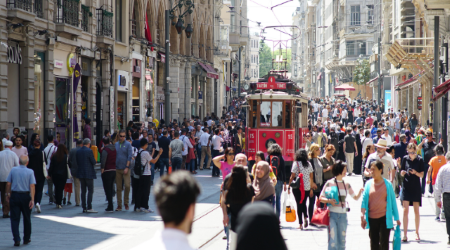War in Ukraine: A View from India
I was born and raised in Mumbai, India, and later went on to New Delhi and Canada for my higher education and finally to the US as a first-generation immigrant. All in all, I have lived in India for about 30 years, though I now reside in Singapore. My parents, brother, and in-laws all live in India. I also have very close friends there with whom I grew up, and professional contacts with whom I worked. I feel very closely connected with India and visit on a regular basis.
So far, the impact of Russia’s invasion of Ukraine on day-to-day lives of Indians has been inconsequential, mostly because of the vast geographical distance to Ukraine and unfamiliarity with the people and their culture. But there are some potential issues and impacts that have people worried. Perhaps the most visible impact more than a month into the conflict has been the rise in fuel prices which is causing public discontentment. This price hike comes at a time when inflation in the country is rampant, and the cost of essentials has risen exponentially.
Another thing that has individuals in India and across much of Asia concerned is China’s reaction to the war, since China is probably viewed by many as the greatest political, economic, and military threat to India. They are also especially curious about what China’s position on Ukraine might mean for its approach to the Taiwan issue in the future.
India, because of the size of its economy and close economic and military ties with Russia (India is the world’s largest buyer of Russian weapons), is poised to potentially play a pivotal role in the outcome of the current crisis and the construct of the global economic and political order that follows. If India provides, along with China, an economic and political lifeline for Russia, it can determine the success or failure of economic sanctions and hence the outcome of the current crisis. So far, India has firmly and repeatedly abstained from voting against the Ukraine war in recent UN resolutions.
The country has a long history and stated policy of “non-alignment” that it has upheld for decades and so this position is not difficult to justify. It has not condemned the war – however, it has recently strongly condemned what it terms the genocide in Ukraine. Most of the pro-government media in India appears to be echoing the Russia narrative of events. Anti-Western feelings are also commonly expressed in local media as a result of the war. There are however a few strong voices in the more liberal media that strongly condemn what they see as Russian aggression and inhumane violence against civilians. The public in India largely has a pro-Russia stance, consistent with the narrative put forth by the current national government and mainstream local media that supports it. Many citizens generally support the government’s position in the global crisis, and believe that Russia was “wronged” and provoked by NATO and pushed to the brink, thus leaving it no choice but to go to war.
It is important to remember that Russia has long offered support to India at critical times in its political and military history. India and Russia also have strong and longstanding ties in many fields including defense and education, especially in the fields of politics, defense, civil nuclear energy, anti-terrorism co-operation, and space exploration. It cooperated with India to build 20 nuclear reactors for civil energy.
Ukraine was, until recently, home to thousands of Indian students, especially in STEM institutions. The war there came into public focus when the evacuation of stranded Indian students in Ukraine by the Indian government was riddled with challenges, since land and air routes became unsafe and not easily accessible. Because of its geographical distance from Ukraine, India has not been touched by the refugee crisis. Though international NGOs are active in India, and it is likely that they are driving fund raising campaigns, such campaigns seem to be below the public radar and are not very visible.
Diplomatically, India has come under significant pressure because of its neutral stance on the Ukraine issue. Its official silence comes at a time when the Western world accuses Russia of war crimes, brutality, and genocide, and has been interpreted by many in the West as being pro-Russia and complicit.
The war’s impact on business and the economy
India’s GDP declined precipitously in Q2 of 2020 during the first phase of the pandemic, and again in Q2 of 2021 when the delta variant broke out. Each time, the rebound was equally strong, so that by the end of 2021 GDP was already 6 percent above prepandemic levels. After growing by 8.2 percent for the calendar year 2021, The Conference Board had initially forecasted an equally strong 8.9 percent for 2022. When the war in Ukraine started, we downgraded the forecast for 2022 to 8.6 percent.
The inflation impact of the war is much more pronounced. Food items make up about half of consumption expenditures tracked by the consumer price index (versus about 10-20 percent for mature economies). This makes India particularly vulnerable to spikes in global food prices, which were already elevated but have in response to the conflict risen further. Indeed, inflation has already reached 7 percent in March 2022 on a yearly basis, with half of the contribution coming from food inflation. This is above the Reserve Bank of India’s upper target band of 6 percent, and while it has been one of the more dovish Central Banks so far, it shifted course in early April with a 40bp hike and shifting the guidance to prioritize inflation overgrowth. Even with this rate hike, the current stance is still accommodative, but this is likely to change with subsequent hikes over the coming months.
Perhaps the greatest threat to India’s economy is the possibility of the US and other conforming nations imposing secondary sanctions on countries doing business with Russia. India currently does not support the sanctions regime, but if India accelerates its economic support for Russia, pressure could build within the US and among its allies and partners to strengthen the sanctions regime. It is important to note that today, US trade with India dwarfs India’s trade with Russia.
On a firm level, there is growing concern about cyber risk and vulnerabilities among US and EU multinational corporations doing business in India, and in some India-based firms there has been polarization among employees around political views and the imposition of a “cancel culture” of those who are pro-Ukraine. Also, companies are generally unwilling to openly state their positions (if pro-Ukraine) openly, so they don’t antagonize the national government.
Just how long India will be able to maintain its current “neutral” position is an open and often debated question in India. What may follow is a source of worry and concern among Indians everywhere.

















